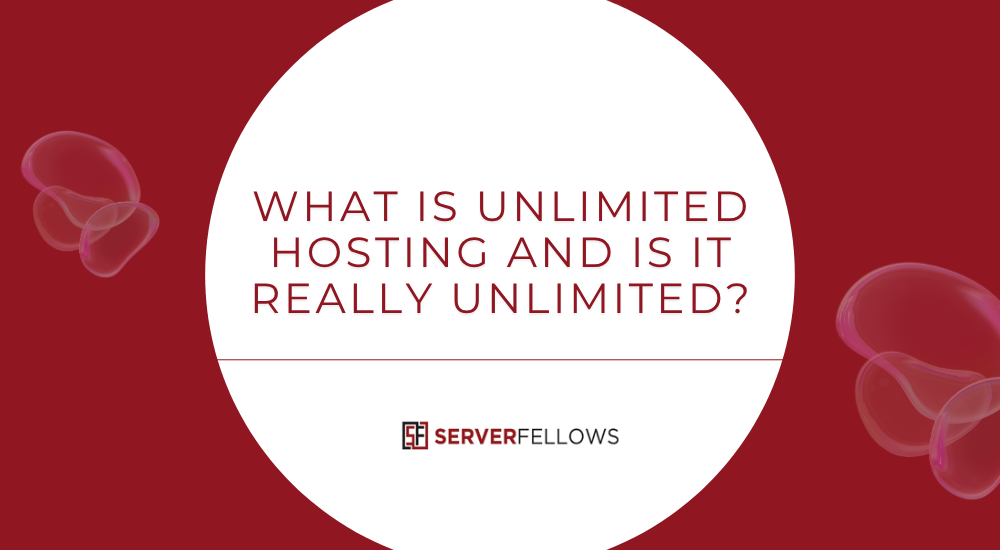
What Is Unlimited Hosting and Is It Really Unlimited?
When exploring web hosting options, you’ll likely come across the term “unlimited hosting.” It sounds ideal — unlimited space, bandwidth, and email accounts at an affordable price. But what does unlimited hosting actually mean, and is it truly limitless?
In this guide, we’ll unpack the meaning behind unlimited hosting, how it works, what limitations actually exist, and when it’s the right (or wrong) choice for your website.
If you’re looking for a transparent alternative, check out Serverfellows.com — where hosting means clarity, not confusion.
What Is Unlimited Hosting?
Unlimited hosting is a type of shared web hosting plan that claims to remove traditional restrictions on resources such as disk space, bandwidth, databases, and email accounts.
On the surface, it implies you can store and transfer as much data as you want. However, no hosting server can physically offer infinite capacity. Every machine has hardware boundaries defined by its storage drives, RAM, and CPU processing power.
The “unlimited” label is more of a marketing shorthand — it tells you that the limits are generous enough that most normal websites won’t hit them under standard usage conditions.
At Serverfellows.com, the philosophy is simple: offer generous resources, but always be upfront about what users actually get.
How Unlimited Hosting Works Behind the Scenes
In shared hosting environments, multiple websites share a single server’s resources. To make pricing simple, many hosts advertise “unlimited” space or bandwidth because, statistically, most websites only use a small fraction of what’s available.
Here’s the logic:
-
Average websites use little space.
Most business sites occupy less than 2–5 GB of storage. -
Bandwidth consumption is predictable.
Even a few thousand monthly visitors rarely consume more than 50 GB of data transfer. -
Providers bank on averages.
Since not everyone uses heavy resources, the server can comfortably handle multiple sites labeled “unlimited” without exceeding capacity.
It’s a model that works as long as no single site abuses the shared environment. Once someone uploads huge files or hosts high-traffic applications, the fair-usage policies kick in.
What Unlimited Hosting Usually Includes
When a plan is advertised as unlimited, it typically refers to three main elements:
1. Unlimited Storage
You can upload files such as website pages, images, and small videos without worrying about a strict quota.
However, uploading large raw videos, archives, or backups is usually prohibited. Providers may include clauses preventing “storage abuse.”
2. Unlimited Bandwidth
You can serve a high number of visitors without facing data-transfer charges. But if traffic spikes beyond normal parameters — for instance, a viral campaign or file-sharing site — your account could be throttled or suspended.
3. Unlimited Email Accounts
You can create multiple business email addresses for your domain.
Still, each inbox might have its own storage limit (for example, 1 GB per mailbox) even if the overall plan says “unlimited.”
These caveats show that unlimited hosting is not infinite — it’s simply more flexible than fixed-limit plans.
For website owners who prefer clarity and control, Serverfellows.com provides transparent allocations and upgrade options without hidden thresholds.
The Reality Behind “Unlimited” Hosting
Fair-Usage Policies
Every unlimited hosting plan includes a fair-usage policy that defines what counts as normal usage. If your site exceeds those norms — say, by consuming 20% of server CPU continuously — the host can restrict your account to maintain stability for others.
Server Resource Limits
Even if disk and bandwidth are labeled “unlimited,” system resources such as CPU, memory, and concurrent processes remain limited.
For example, you might have:
- 1 CPU core usage cap
- 512 MB RAM limit
- 20 concurrent connections allowed
These unseen restrictions ensure that one account doesn’t overwhelm shared infrastructure.
Performance Throttling
To maintain fairness, hosts may throttle sites that use excessive resources. This can result in slower page load times or temporary downtime until usage normalizes.
Terms of Service Clauses
Hidden within the fine print, you’ll often find statements that prohibit using unlimited hosting for:
- File storage or backup archives
- Video or audio streaming platforms
- Proxy or gaming servers
Understanding these conditions helps avoid surprises later.
Transparency matters — that’s why Serverfellows.com clearly lists CPU, RAM, and storage details upfront.
Pros and Cons of Unlimited Hosting
Let’s weigh the advantages and disadvantages to determine if unlimited hosting suits your needs.
Advantages
-
Cost-Effective
Unlimited hosting often provides the best price-to-resource ratio for small and medium websites. -
Beginner-Friendly
You don’t need to calculate bandwidth or space usage manually. -
Reduced Anxiety Over Overage Fees
There’s comfort in knowing you won’t suddenly be charged for exceeding storage. -
Multiple Websites Under One Plan
Many providers allow hosting several domains on a single unlimited account.
Disadvantages
-
Misleading Marketing
“Unlimited” gives a false sense of infinite capacity. -
Hidden Usage Rules
Fair-usage clauses can lead to throttling or account suspension. -
Inconsistent Performance
Because resources are shared, performance can fluctuate depending on other users. -
Difficult Scalability
Once you outgrow shared infrastructure, migration to VPS or dedicated hosting becomes necessary.
Choosing a host like Serverfellows.com ensures clarity. You know your limits, and you can scale smoothly when your site grows.
Who Should Consider Unlimited Hosting?
Unlimited hosting works well for certain users — especially those running modest sites that don’t demand heavy resources.
Ideal For:
- Personal Blogs: Light media and moderate visitor counts.
- Portfolio Websites: Designers, photographers, or freelancers with standard traffic.
- Small Businesses: Brochure-style sites or e-commerce stores with limited products.
- Startups and New Ventures: Affordable entry point without worrying about immediate upgrades.
Not Recommended For:
- Large media or streaming platforms
- High-traffic e-commerce stores
- Web applications requiring heavy database queries
- File-sharing or download-intensive services
If you fall into these categories, consider scalable cloud or VPS hosting instead of unlimited shared plans.
What Makes Unlimited Hosting Seem Attractive
Many new website owners choose unlimited hosting because of:
- Simple marketing: “No limits” feels reassuring.
- Flat pricing: A single fee instead of tiered plans.
- Ease of setup: Quick onboarding without technical decisions.
However, seasoned webmasters know that the real cost appears when performance dips or terms are misunderstood. A transparent provider like Serverfellows.com eliminates such uncertainty by defining every limit in plain language.
Understanding Fair-Usage Policies in Detail
Let’s explore what a fair-usage policy (FUP) usually entails:
-
CPU and Memory Caps
Your website can only use a small percentage of total server power — often 10–20% — to prevent overloads. -
File Quantity (Inodes) Limits
Even with unlimited storage, there might be a maximum number of files allowed (for example, 200,000 inodes). -
Database Size Restrictions
MySQL databases may be limited to certain MB or row counts. -
Email Sending Quotas
To prevent spam, hosts restrict outgoing emails per hour. -
Backup and Archiving Prohibition
Using hosting space as a storage drive for personal files violates most FUPs.
Knowing these hidden parameters helps you decide whether unlimited hosting aligns with your website goals.
Performance and Reliability Considerations
While unlimited hosting can appear generous, performance is shared among hundreds of sites on the same server.
This can lead to:
- Slow Response Times: When neighboring sites experience traffic surges.
- Downtime Risks: If server resources are oversaturated.
- Limited Control: You can’t customize configurations or install advanced software.
If consistent uptime and faster response times matter, consider premium shared or cloud hosting plans like those offered at Serverfellows.com — where servers are optimized for stability and fairness.
Alternatives to Unlimited Hosting
1. Cloud Hosting
Scalable infrastructure that grows with your needs. Pay only for what you use.
2. VPS (Virtual Private Server) Hosting
Dedicated resources within a shared environment. Ideal for developers or mid-sized businesses.
3. Managed WordPress Hosting
Tailored for WordPress sites with automatic updates, backups, and performance tuning.
4. Dedicated Hosting
A complete physical server for your website alone — best for enterprises or heavy-traffic portals.
Each of these alternatives offers predictable performance and clear limits, which is exactly what Serverfellows.com provides through transparent pricing and scalable upgrades.
Common Misconceptions About Unlimited Hosting
“I Can Host Anything I Want.”
Not true. Most unlimited plans prohibit file storage unrelated to website operations.
“I’ll Never Face Downtime.”
Even unlimited servers can experience overload or maintenance downtime.
“It’s the Same as Cloud Hosting.”
Cloud hosting dynamically allocates resources, while unlimited shared hosting divides a fixed pool.
“All Providers Offer the Same Thing.”
Quality, uptime guarantees, and support responsiveness vary widely among hosts.
Understanding these nuances keeps you from falling for unrealistic promises.
How to Choose the Right Hosting Plan
When evaluating hosting options, focus on:
- Transparency: Does the provider clearly list CPU, RAM, and bandwidth details?
- Scalability: Can you upgrade easily without migrating to a new host?
- Support Quality: 24/7 technical support matters when issues arise.
- Data Backups: Regular backups protect your site from accidental loss.
- Performance Guarantees: Look for uptime SLAs and monitoring systems.
At Serverfellows.com, all these aspects are built into every plan. You get clear metrics, quick support, and fair pricing — no misleading “unlimited” tags.
FAQs on Unlimited Hosting
Is unlimited hosting truly unlimited?
No. Every server has finite hardware resources. Fair-usage policies ensure one user doesn’t consume disproportionate capacity.
Why do companies advertise unlimited hosting?
It’s mainly a marketing approach. Since most websites don’t use much space or bandwidth, the term appeals to budget-conscious buyers.
Is unlimited hosting bad?
Not necessarily. It suits small sites with steady traffic but isn’t ideal for resource-intensive projects.
Can I run multiple websites on unlimited hosting?
Yes, most plans allow multiple domains. Still, overall resource consumption remains subject to fair-usage limits.
What’s better than unlimited hosting?
Transparent, scalable hosting with predefined limits — such as the clear, reliable plans available at Serverfellows.com.
Conclusion: Transparency Beats Illusion
The phrase “unlimited hosting” may sound perfect, but it’s often more illusion than reality. While these plans offer flexibility for small projects, they rely on shared resources that can quickly reach unseen limits.
If you value performance, uptime, and honesty, choose hosting that’s transparent about its capabilities.
Experience clarity and reliability with Serverfellows.com — where your website gets the power it deserves, without the marketing smoke and mirrors.


